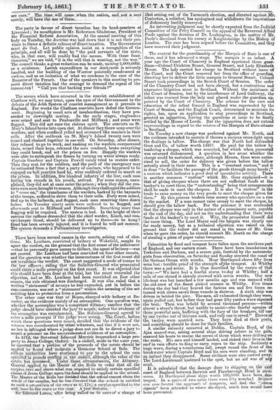The contest for the guardianship of the Marquis of Bute
is one of these, and it has advanced a stage. The marquis is an infant. A year ago the Court of Chancery in England appointed three guar- dians—Colonel Crichton Stuart, General Stuart, and Lady Elizabeth Moore. The lady carried her charge to Scotland without leave of the Court, and the Court removed her from the office of guardian, directing her to deliver the little marquis to General Stuart. Colonel Stuart took proceedings in the Scotch Court of Session. The order of the Chancery Court had not been obeyed, but a contentious and expensive litigation arose in Scotland. Without the assistance of the Court of Session, but by the interference of Lord Galloway, the infant was rescued from the lady and placed under the guardian al* pointed by the Court of Chancery. The scheme for the care and education of the infant framed in England was superseded by the Court of Session, and the English Court, determined to maintain its rights, has, upon an application to stay proceedings in Scotland, granted an injunction, leaving the questions at issue to be finally settled by the House of Lords. But the injunction does not extend toproceedings in regard to the estates of the Marquis of Bute situate in Scotland.
On Tuesday a new charge was preferred against Mr. North, and the evidence intended to sustain it throws a curious cross-light upon the dealings in tallow. The charge was that North had defrauded Goss and Co. of tallow worth 1497/. He paid for the tallow by tendering a cheque, which was accepted, but which when presented was returned dishonoured. A question in law arose whether the charge could be sustained, since, although Messrs. Goss were autho- rized- to sell, the order for delivery was given before the tallow
actually stood in their name. This is a "constant custom," and it is done "to facilitate the passage of the goods through many hands ;" a custom which indicates a good deal of speculative activity. There is another common "custom" which Mr. Goss explained—it is that of giving cheques where there are not sufficient funds at the banker's to meet them, the "understanding" being that arrangements shall be made to meet the cheques. It is also 'a custom" in the trade to raise money on the very goods to meet the cheque given for them." By this process traders raise money who speculate on a rise in the market. If a man cannot raise money to meet the cheque, he should give the tallow back. For the prisoner it was contended that the cheque was only in the nature of a promissory note, payable at the end of the day, and not on the understanding that there were funds at the banker's to meet it. Why, the prosecutor himself did
the same thing. The Lord Mayor said the bargain was clearly one for ready money, but as a technical objection was raised on the ground that the tallow did not stand in the name of Mr. Galli when he gave the order, he should commit Mr. North on the charge of stealing a piece of paper value twopence.






























 Previous page
Previous page